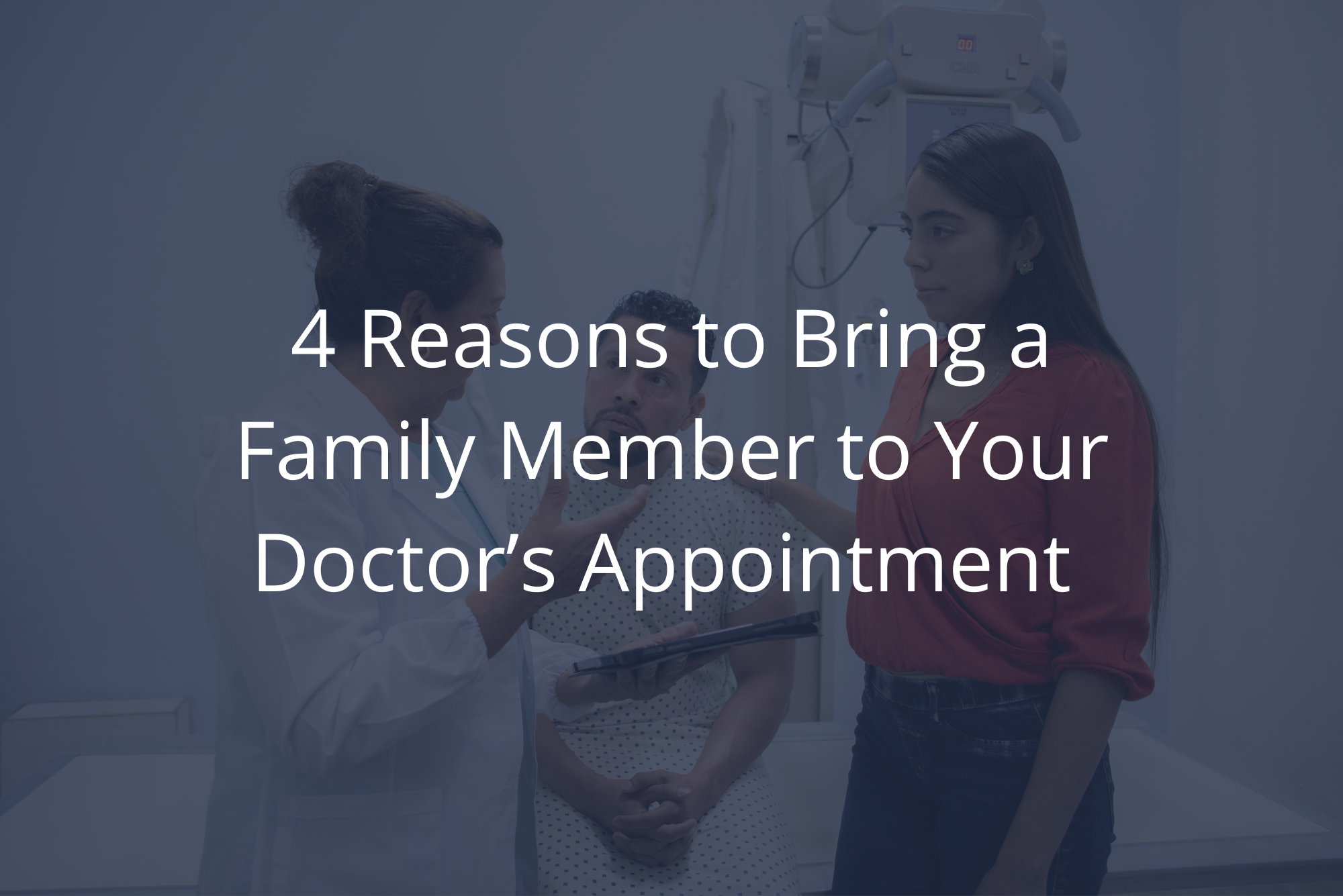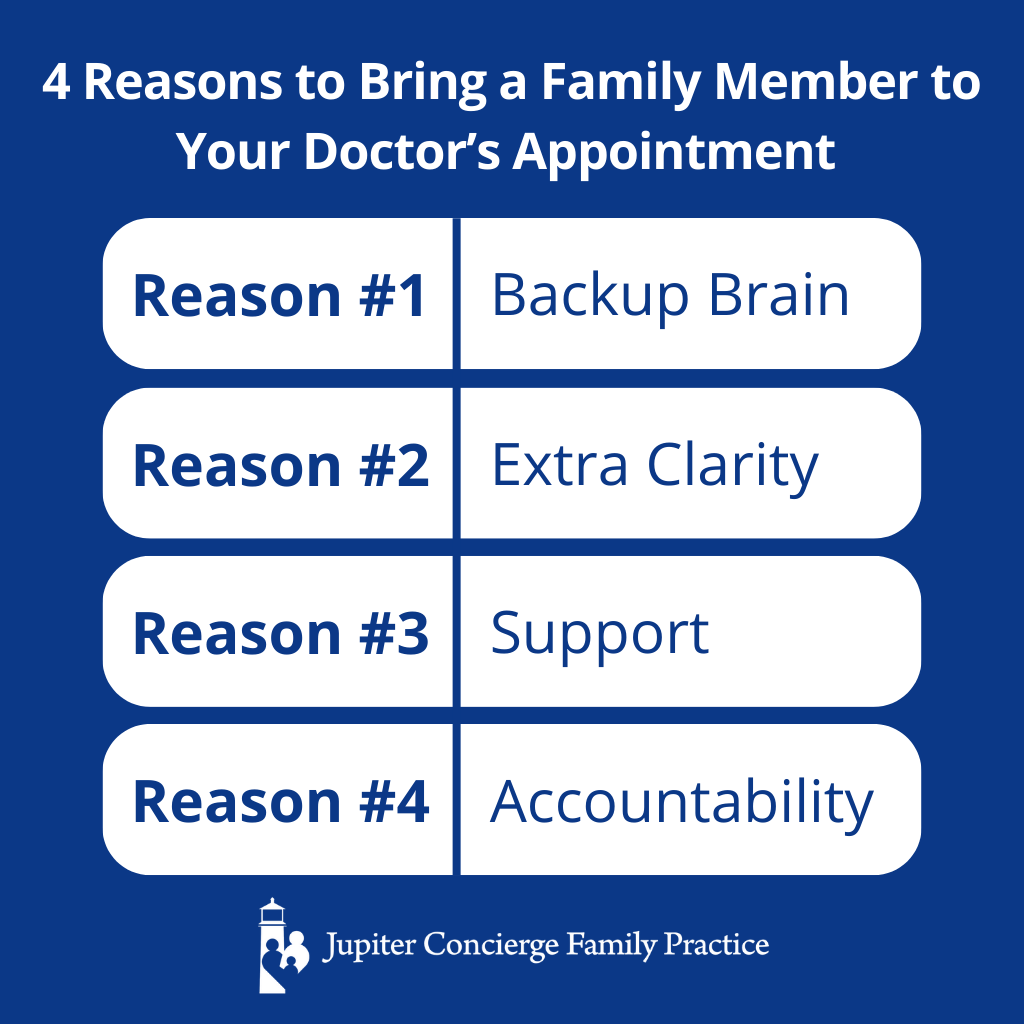
As a concierge physician in private practice, I have plenty of time to spend with my patients.
Appointments in my office aren’t rushed because of the unique structure of this model of medical care. Consequently, my patients and I can have thoughtful, thorough conversations.
And while this is pretty close to perfect, there is one thing more people might benefit from: bringing a trusted family member with them.
Yes, You Can Bring Someone to Your Doctor’s Appointment!
Those who’ve never done this before may experience some uncertainty about bringing a loved one along. In fact, “Can I bring someone to my doctor’s appointment?” is a popular search on Google.
Rest assured, this is a perfectly acceptable practice, though keep these two qualifications in mind:
- Trust is absolutely required between you and the family member you wish to bring. Strong boundaries and mutual respect are prerequisites to attending medical appointments together.
- A person you live with is ideal. If a spouse or someone from your home fits the trustworthy bill, you’ll get the most benefit from having them at your appointment. If not, though, bringing along a trusted person who doesn’t live with you is still better than going alone.
This kind of arrangement works well in a concierge practice because we have the time and relationship to talk openly and in depth. It’s a conversation among trusted people who care for your health.
The Perfect Example
To illustrate what I mean, there’s a particular couple that springs to mind. We’ll call them Jane and Don Smith. The Smiths are a capable, recently retired couple. They always come together to every office visit.
The Smiths listen, ask questions, and speak up for one another. They’re not presumptuous; they don’t tattletale, and they always give the other person privacy and space if needed. As a result, they get the single most efficient visit of any of my patients, hands down.
Let’s examine the specific reasons why having a family member at your medical appointments can be so helpful:
Reason #1: Backup Brain
Imagine you’re coming in for a specific issue, what physicians call a chief complaint. A trusted family member can help you remember duration, severity, and an overall description. Alone, you might miss those details — either because you forget or because you’re unaware of them.
This gives your doctor a better understanding of what’s going on. With that well-rounded view, they can provide you with more accurate recommendations and treatment options.
Reason #2: Extra Clarity
It’s not uncommon for a patient to agree with a doctor, but not truly have a clear understanding of what the doctor is recommending. Sometimes they know they’re missing something and don’t speak up at the moment. Other times, they don’t realize they’re confused until later, when they’re trying to implement the recommendation or explain it to someone else.
If you bring a family member to your doctor’s appointment, they can help you interpret what your doctor tells you. If they don’t understand something about the next steps or instructions, they can ask clarifying questions you might not think of. They can take notes so you can speak freely with the doctor without missing anything or forgetting about it later.
Medical information isn’t always straightforward. It can have different levels and layers and can be interpreted in many ways. In the spirit of “two heads are better than one,” having two sets of ears at an appointment provides insurance against misunderstandings and missed details.
Reason #3: Support
For many people, medical visits can be scary — even traumatic. Whether the news is good or bad, it’s easy to become engulfed in the emotional experience and lose track of what the doctor is saying. Bringing along someone who loves you can make everything easier.
We’ll start with good news. Let’s say you have a diagnosis, and you get good news. The lifestyle changes you’ve made are working. You’re improving! That’s great news… and now is not the time to revert to your old ways. When you have a loved one with you, they hear that emphasis, too. They can celebrate with you and encourage you to keep going.
Of course, bad news is more difficult. Having a loved one present can help anchor you. If a patient is alone, they may not hear anything after the initial communication — and that’s important. Your doctor may share a difficult diagnosis, but the illness may have a good prognosis or crucial next steps you need to remember. Emotional support helps you receive all the crucial information, whether at the moment or through a family member communicating with you again later.
Whatever the news, it’s also simply nice to not feel alone, especially at serious doctor’s appointments.
Reason #4: Accountability
When you go to the doctor, it’s to get advice that will help you make decisions to benefit your health. If you don’t make a plan with the information you get — and take action on that plan — the visit is just a waste of your time.
A family member can help you ensure your doctor’s appointments have an actual effect on your health by:
- Reminding you of the doctor’s instructions
- Reminding you of any resources provided
- Encouraging you to stick with the plan
- Encouraging you to contact the doctor if the plan needs modification
This type of support can be critically important to the successful implementation and follow-through of a health plan.
Go Ahead — Bring a Trusted Loved One to Your Doctor’s Appointment
The quality of your doctor’s appointments and subsequent treatment plans can increase exponentially when you bring a trusted loved one.
From asking the right questions to helping with follow-through to providing insights to the doctor and support to you, the benefits are numerous. Bringing a loved one to an appointment is a clear example of better together — everything becomes easier to do.

Dr. David Rosenberg
Dr. Rosenberg is a board-certified Family Physician. He received his medical degree from the University of Miami in 1988 and completed his residency in Family Medicine at The Washington Hospital in Washington, Pennsylvania in 1991. After practicing Emergency Medicine at Palm Beach Gardens Medical Center for two years, he started private practice in Jupiter, in 1993. He is an avid baseball fan and Beatles fanatic, since he was 8 years old. He has been married to his wife, Mary, since 1985 and has three grown children.
David completed additional studies at Mercer University, Macon, Georgia and obtained a BS in Chemistry in 1983.
“My interests include tennis, snow skiing, Pilates and self-development.”

Subscribe to our Newsletter!
Receive latest blog posts, health tips, and exclusive offers from Jupiter Concierge Family Practice straight to your inbox.

